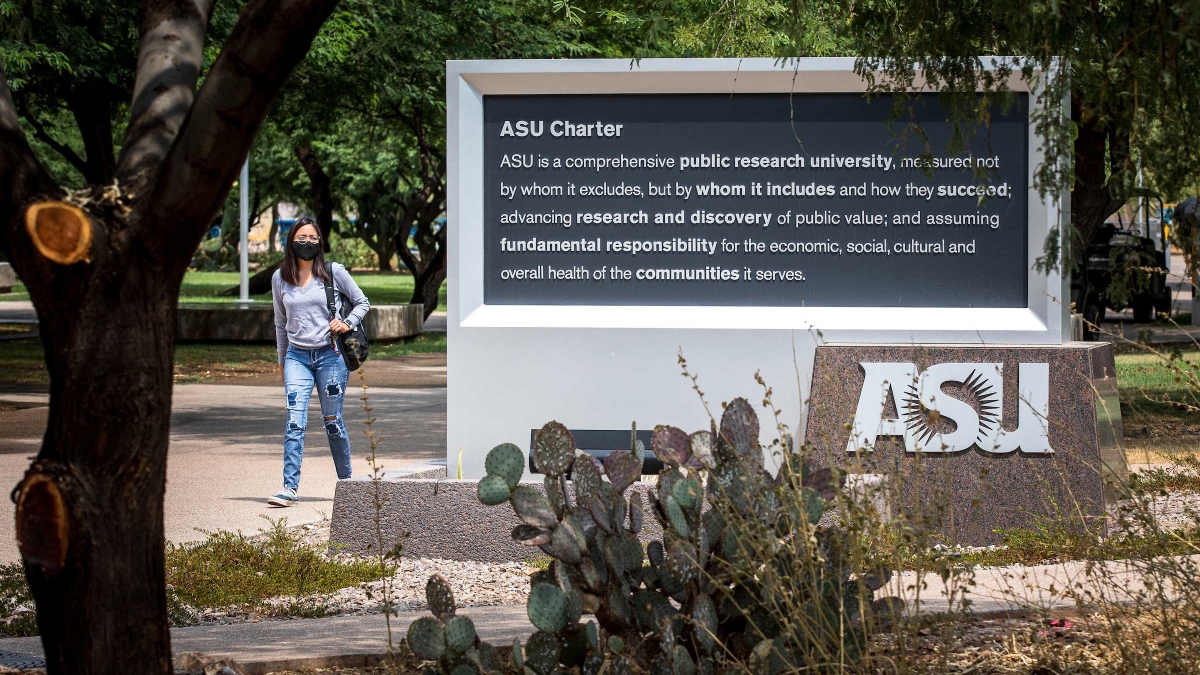New ASU initiative to accelerate innovations in higher education that expand access and empower learners

Students walk past the ASU charter sign on the Polytechnic campus on the first day of the fall semester Aug. 20. Photo by Charlie Leight/ASU Now
With a shifting landscape facing learners of all kinds, Arizona State University today announced a new initiative that will accelerate the university's efforts to redesign American higher education. The initiative is supported by the Stand Together community.
"The work advanced through this partnership will drive a culture change and the commitment to redesign and restructure higher education that we embrace at ASU and that is critical to the success of students across the country," said ASU President Michael M. Crow. "The public health pandemic that has swept the globe and the stress it has placed on our education system has exposed weaknesses that have existed for years. Universities are being forced to adapt right now, and so we're saying, 'Let's take advantage of this opportunity and let's build things in a way that serves the learner in a new world that doesn't look anything like the one that existed when most of America's institutions of higher learning were designed.'"
ASU's new University Design Institute (UDI) will coordinate the initiative and support other universities to implement their own culture change initiatives. The goal is to broaden access to world-class education methods and cutting-edge technological innovations that are tailored to empower students and be responsive to their specific needs and goals. ASU's design-driven commitment to both educational access and scholarly excellence — two historically opposing objectives — has captured the attention of leaders within and outside universities from around the world. The former teachers college stands out among research universities in such factors as its 380% increase from 2002 to 2019 in enrollment of students from low-income families. During this same period, first-generation undergraduate student enrollment increased from 7,500 to nearly 26,000, Hispanic undergraduate student enrollment increased from about 5,000 to 20,500, and Black undergraduate student enrollment increased from less than 1,500 to more than 4,500.
Financial commitments by the Charles Koch Foundation, the Morgridge Family Foundation, Michael and Beth Kasser, Ambassador Frank and Kathy Baxter, Mike and Cindy Watts, the O'Neil Family Foundation and Gary and Claudia Phillips are supporting the initiative. The nearly $12 million in donor gifts will contribute to an overall campaign to raise $30 million to support this initiative. With these gifts, ASU will:
- Advance development of the UDI to build partnerships with university leaders who are driving broad-based innovations at their respective institutions.
- Accelerate the development of a stackable credential system that will make it easier for students, initially at ASU and eventually at other universities, to adjust their course selection to reflect individualized aptitudes and interests and represent mastery of knowledge and skills relevant to student preferred career paths.
- Develop key technological components of the world's first Trusted Learner Network to drive adoption of a verifiable learner-owned record system that has the potential to replace current transcripts with a less expensive, competency-based credential that lives with the learner themself, rather than with various institutions.
- Scale ASU's high school programs to enroll 30,000 additional students into ASU's digital high school curriculum and reach an additional 30,000 students with personalized online learning and career development tools.
"The principle of individual empowerment and a student-centric approach to learning and to education is a shared commitment, one where we are called to take action and broaden the network of stakeholders engaged in bringing about a change of culture," said Crow. "The goal is not to replicate ASU, but to advance a design model that enables every university to put learners, of all ages and life circumstances, at the center, implemented in the way that works best for the students served by that institution."
The institute already plays a key role in sharing lessons learned through ASU's transformation.
"UDI is intended to help universities speed innovation, enhance outcomes, lower costs and scale impact," said Crow. "The point is to not have one model, but to have many models that fit the circumstances of anyone who aspires to learn and to contribute to their community."
"ASU has made transformational changes in its comprehensive efforts to improve access and learning outcomes for its students at an affordable cost. This new initiative will invite other universities to develop and apply new ideas in partnership with their peers, leading to increased opportunity for millions of learners," said Charles Koch Foundation Executive Director Ryan Stowers. "We are thrilled to support this work to empower university leaders with a forum and support network to help drive innovation and better serve their students. There is no better time than now to think about how we can innovate to open new opportunities for as many people as possible."
Watch this video to learn more about the partnership.
More Arts, humanities and education

School of Social Transformation faculty member assumes new title with NSF
School of Social Transformation faculty member and Founding Executive Director of the Center for Gender Equity in Science…

ASU's Neal Lester reflects on life, death of poet Nikki Giovanni
When Neal Lester heard on Monday that poet and activist Nikki Giovanni had died, the news hit hard.Lester, the founding director…

Learning by stepping outside
By Adriana MaestasAmid a world increasingly captivated by all things digital, more than 200 Arizona teachers have crafted…